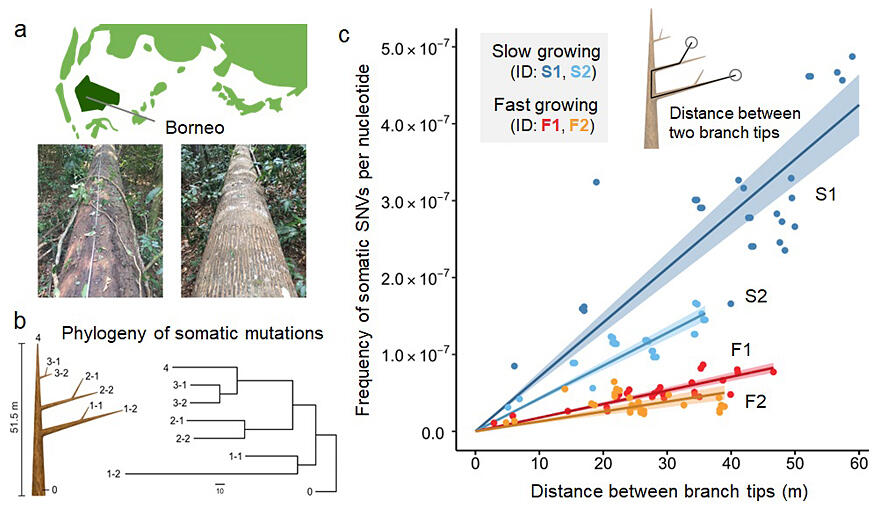The biodiversity seen on Earth was created by a series of mutations in the DNA sequences of living organisms. How these mutations occur in the natural environment and cause changes in the genomes of organisms remains largely a mystery. In particular, little is known about the mechanisms of mutation generation in tropical ecosystems with very high biodiversity.
The research group led by Professor Akiko Satake, Research Fellow Ryosuke Imai and Associate Professor Eriko Sasaki of the Graduate School of Science at Kyushu University, Graduate Student Sou Tomimoto of the Graduate School of Systems Life Science (SLS) at Kyushu University, Associate Professor Masahiro Kasahara of the Graduate School of Frontier Sciences at the University of Tokyo, Senior Researcher Naoki Tani of the Forestry Division at the Japan International Research Center for Agricultural Sciences (JIRCAS), Professor Yoshihisa Suyama of the Graduate School of Agricultural Science at Tohoku University, and researchers from Universitas Gadjah Mada, Indonesia has newly sequenced the genome of two species of the genus Shorea of the family Dipterocarpaceae (which are more than 300 years old on the equatorial island of Borneo) and successfully detected somatic mutations that have accumulated over a long period of time. The results have been published in the journal eLife.

(b) Phylogenetic tree within an individual tree constructed from somatic mutations. The phylogenetic tree was consistent with the physical tree structure. (c) Accumulation of somatic mutations (vertical axis) with branch elongation (horizontal axis).
Provided by Kyushu University
Somatic mutations were analyzed in two tree species with different growth rates: the slow-growing Shorea laevis and the fast-growing Shorea leprosula. The results revealed that in both species, the number of such mutations increased linearly with branch extension. The estimated somatic mutation rate per meter of branch growth was 3.7 times higher in the slow-growing S. laevis than in the fast-growing S. leprosula. However, the mutation rate per year was constant between both species, being independent of growth rate. This suggests that somatic mutations accumulate in an absolute time-dependent manner, rather than through cell division associated with branch elongation.
The study also examined whether newly arising mutations were subject to natural selection. The results showed that although somatic mutations were largely neutral within individuals, mutations passed on to the next generation were subject to strong negative natural selection. Climate changes associated with global warming are adversely affecting ecosystems, and many species in the tropics are being lost. The ability of tropical trees to adapt to these climate changes depends on the genetic diversity within the tree population.
This research will contribute to the conservation of tropical biodiversity by improving our understanding of the mechanisms of mutation that cause genetic diversity.
Journal Information
Publication: eLife
Title: The molecular clock in long-lived tropical trees is independent of growth rate
DOI: 10.7554/eLife.88456
This article has been translated by JST with permission from The Science News Ltd. (https://sci-news.co.jp/). Unauthorized reproduction of the article and photographs is prohibited.




